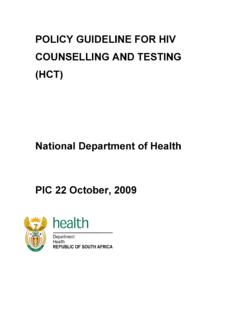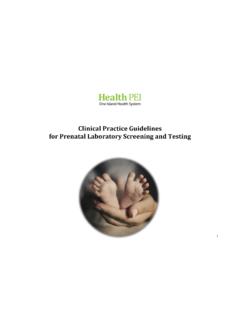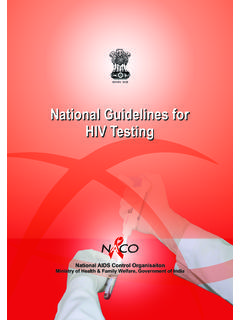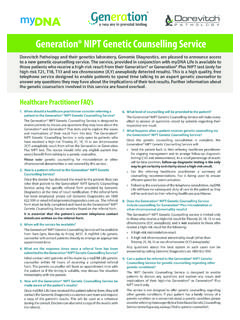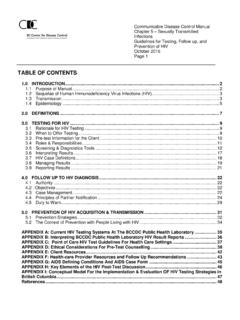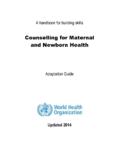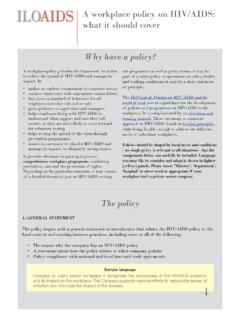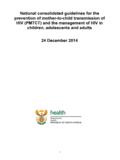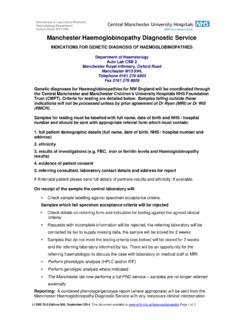Transcription of HIV/AIDS Voluntary Counselling and Testing - WHO
1 I HIV/AIDS Voluntary Counselling and Testing Review of Policies, Programmes and Guidelines in East, Central and Southern Africa Commonwealth Regional Health Community Secretariat for East, Central and Southern US Agency for International Development, Regional Economic Development Services Office for East and Southern Africa (USAID/REDSO) ii Commonwealth Regional Health Community Secretariat for East, Central and Southern Africa, 2002 AICC Building, Serengeti Wing, 7th floor PO Box 1009 Arusha, Tanzania tel: +255 27 250 8368 or 250 4105/6 fax: +255 27 250 4124 or 250 8292 email: editing and production: Helen van Houten page and cover layout: Damary Odanga printing: Print Options Correct citation: Commonwealth Regional Health Community Secretariat.
2 2002. HIV/AIDS Voluntary Counselling and Testing : review of policies, programmes and guidelines in east, central and southern Africa. Arusha, Tanzania. Arusha: CRHCS. iii Contents iv v Executive vi HIV Testing in east, central and southern Africa .. vi VCT policies ..vii Guidelines for implementing VCT ..vii VCT viii Priorities for future action .. ix 1 Introduction .. 1 Methods .. 1 VCT a key intervention .. 2 VCT ECSA 4 Definition of VCT .. 4 HIV Testing in ECSA .. 5 VCT policy 6 Current status of VCT policies .. 6 Policy development .. 8 Policy implementation .. 9 Key policy issues .. 10 Guidelines for implementing 11 Current status of VCT guidelines .. 11 Guideline development .. 11 Key issues related to VCT guidelines .. 12 VCT 12 VCT delivery models .. 12 Strategies to promote VCT and increase its use.
3 15 Quality assurance .. 15 Implementation challenges .. 16 Best practices .. 17 Unique features of existing VCT programmes .. 18 Way 19 Priorities for future action .. 19 Issues for further research .. 21 Appendix 1. Country 22 Kenya .. 22 Malawi .. 24 Uganda .. 27 Zambia .. 29 Zimbabwe .. 32 Appendix 2. Scope of national VCT guidelines in 35 Abbreviations and 36 iv Foreword HIV/AIDS is a major challenge to health and development. It is putting a tremendous burden on health care facilities and is decreasing economic productivity. Many governments in east, central and southern Africa have officially declared HIV/AIDS a disaster requiring emergency action. The various approaches being used to combat the epidemic must be intensified, refined and expanded to slow down the spread of the virus and mitigate its impact.
4 Nearly all governments in the region have also developed strategies that indicate the current status of the epidemic, how it is affecting the country, and the priority interventions required to combat it. The multisectoral approach that many countries in the region have adopted calls for increased funding and personnel. At the 30th CRHCS Regional Health Ministers Conference (RHMC) held in Seychelles in October 1999, health ministers, concerned about the rapid spread of HIV in the region and realizing that some strategies currently in use required strengthening, recommended that CRHCS work with member states to mount an effective response to the epidemic and formulate a regional strategy on HIV/AIDS . To begin putting the HIV/AIDS resolutions of the 30th RHMC into operation, the Secretariat convened a consultative workshop from 26 to 30 March 2001.
5 At this workshop, HIV/AIDS managers, nutritionists, specialists in reproductive health and chief nursing officers identified priority issues the region needed to address to step up the fight against the epidemic. Voluntary Counselling and Testing (VCT) was clearly shown to be a key entry point for HIV/AIDS prevention, care and support. Thus it became obvious that it was essential to harmonize and improve VCT policies and guidelines in ECSA, to expand the services to reach more people. To get an overview of what was happening in the CRHC member states, CRHCS commissioned a team of consultants to visit selected states and make a rapid review of their VCT policies, guidelines and programmes. The findings of this review have been and continue to be tabled at various regional forums such as the CRHC Directors Joint Consultative Committee and the RHMC to inform policy makers and elicit discussion on the best ways and means to extend VCT services to reach more people in the region.
6 It is hoped that the findings of this review will contribute to a constructive dialogue among policy makers, programme implementers, and teams responsible for developing policy and guidelines, to chart ways that will increase the availability of VCT to more people in our region. Dr Steven V. Shongwe v Regional Secretary Commonwealth Regional Health Community Secretariat Acknowledgements This review is a result of joint efforts by various people, from conceptualizing and reviewing the scopes of work, through designing and agreeing on the questionnaire, to preparing the final report. Foremost is the work of the two consultants, Grace Osewe and Buhle Ncube, who visited the member states, carried out the field review and drafted the report. Their dedication was crucial to the endeavour. The contributions of Janet Hayman, Mary Pat Kieffer, Stephen Kinoti and other USAID/REDSO, SARA/AED and CRHCS staff are also acknowledged.
7 The support and cooperation offered by member states, HIV/AIDS programme managers and ministries of health, permanent secretaries made the work possible. Leah Sirikwa and Cristin Haggard played key roles in final secretarial and editorial work. Dr Bannet Ndyanabangi Coordinator for HIV/AIDS Programme Commonwealth Regional Health Community Secretariat vi Executive summary The Commonwealth Regional Health Community Secretariat (CRHCS) commissioned a review of policies, programmes and guidelines in Voluntary Counselling and Testing (VCT) as part of its strategy to harmonize and improve them and to promote the best practices for managing HIV/AIDS and sexually transmitted infections in east, central, and southern Africa (ECSA). The review team elicited written responses from national aids programme managers using a detailed questionnaire; they interviewed VCT programme and administrative staff, and primary stakeholders such as technical partners and donors and implementing agencies.
8 In addition, the team conducted an intensive review of both published and unpublished literature on VCT in ECSA and visited programmes in Kenya, Malawi, Uganda, Zambia and Zimbabwe. As the burden of HIV has increased to levels beyond which the national health systems in ECSA can handle, efforts have intensified to scale up effective programmes. VCT is increasingly recognized as central to efforts to combat the epidemic through prevention and care. Access to ARV therapy is increasing. However, estimates are that only 10% of people who are HIV infected know their status and thus can take advantage of the therapy hence the urgent need for better VCT. HIV Testing in east, central and southern Africa The three categories of HIV Testing in ECSA are mandatory, diagnostic and VCT.
9 VCT includes both Voluntary pre- and post-test Counselling and Voluntary HIV Testing . The key word is Voluntary : those concerned about their HIV status initiate the service, without coercion. But currently, most HIV Testing is initiated not by the client but by employers, insurers, or (for students) institutions of higher learning. Most of the non- Voluntary Testing is done in the private sector, and Counselling is minimal. VCT is done mostly by NGOs in collaboration with the national ministries of health, and donor agencies provide most of the technical support and funding. Presently, VCT is carried on chiefly in urban areas, with rural populations in all countries except Botswana having only limited access to it. The stage of VCT implementation falls under one of four categories: 1) NGO and private sector with little or no government involvement, 2) NGO and private sector with government pilot projects, 3) NGO, private sector and public sector with limited expansion and consolidation of pilot projects, and 4) scaling up to nationwide coverage.
10 Vii VCT policies In their national HIV/AIDS policy documents, all ECSA countries recognize that VCT is a major means of HIV/AIDS control. However, as yet only Botswana, Mauritius, Uganda and Zimbabwe have a national VCT policy. Key components of VCT policy include access to Counselling , consent, confidentiality, and overcoming discrimination against people who have undergone Testing and are found HIV positive. Persons with a history of high-risk behaviour, couples planning marriage, and pregnant women are the main groups who should receive VCT services; the next most important group is the youth in general. Implementation is ahead of policy development, with standardized policies and guidelines in general lacking. Guidelines for implementing VCT Most of the current guidelines have been developed by implementing NGOs and are not comprehensive.










